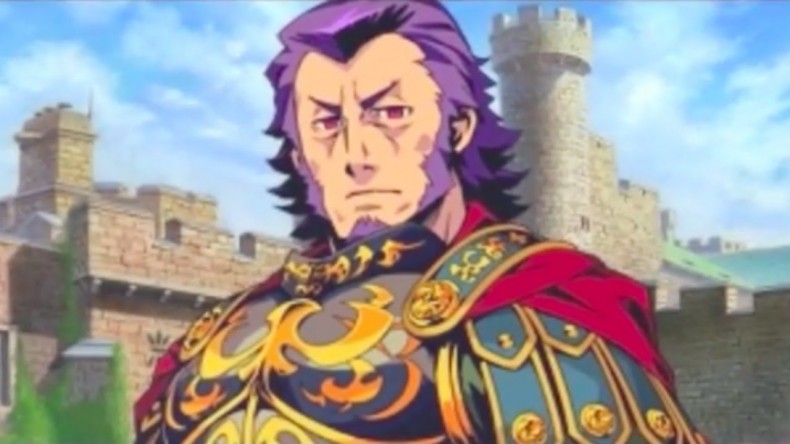There aren’t too many publishers in gaming that get me as excited as Atlus USA. They have been consistently releasing games that interest me over the last few years, like Persona Q and Shin Megami Tensei IV. Recently, I got to have a nice long chat with Atlus USA’s Nich Maragos and John Hardin about localisation in the industry, Etrian Mystery Dungeon, Persona Q, and more. Nich is a Localisation Editor and John is the PR Manager.
Nich Maragos made the jump from game journalism to game localisation after losing his job at 1up.com. “I got to know people at various game companies including an editor at Atlus. You meet tons of people at E3. I got to be friends with Tom from Atlus (USA) at the time and liked his work. When I had gone freelance, he told me about an open position so I applied. I took the tests and they brought me out to Orange County. It has been 9 years since I joined Atlus USA now.”
Shin Megami Tensei: Devil Survivor Record Breaker (out this May in North America) will be the first Megami Tensei game Nich has not worked on at all since joining Atlus. “The first game I worked on was Shin Megami Tensei: Devil Summoner: Raidou Kuzunoha vs. The Soulless Army. Yeah, that’s the full title. It was a lot of fun. I remember talking to my parents, one of whom is Catholic Deacon and mentioning my first game title to them. I said Devil Summoner.”
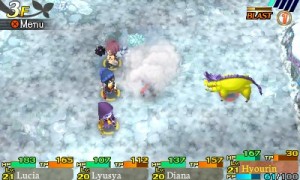 Atlus has released a lot of games in their popular Megami Tensei franchise since Nich joined, including Persona 3 FES, Persona 4, and Shin Megami Tensei: Nocturne. An average day for Nich involves a lot. “I work closely with the translators myself. When I get into work in the morning, I talk to them to see what’s been prepared for me to work on. They do the actual translating and I get the raw translation to work on. I look over everything they have done and make rewrites and changes as appropriate. I also usually ask them about what’s going on in a particular scene or what the broad purpose is since they have a better grasp on the meaning than I do. Once I feel like I have a firm understanding on the meaning of the line, I have enough to make changes so I can get my meaning across very clearly in English.”
Atlus has released a lot of games in their popular Megami Tensei franchise since Nich joined, including Persona 3 FES, Persona 4, and Shin Megami Tensei: Nocturne. An average day for Nich involves a lot. “I work closely with the translators myself. When I get into work in the morning, I talk to them to see what’s been prepared for me to work on. They do the actual translating and I get the raw translation to work on. I look over everything they have done and make rewrites and changes as appropriate. I also usually ask them about what’s going on in a particular scene or what the broad purpose is since they have a better grasp on the meaning than I do. Once I feel like I have a firm understanding on the meaning of the line, I have enough to make changes so I can get my meaning across very clearly in English.”
A lot of people assume everyone involved with localisation plays the games they work on. Nich doesn’t play the games himself. “I don’t actually play the games and the translators play them multiple times. They need to see all the content. In some of the older Shin Megami Tensei games that involved demon negotiation, the negotiation text is usually almost as long as the main story. A lot of the time, I don’t even do that text because we have an editor for that. His job is just to handle negotiation text.”
John tells us about one of the most coveted job positions at Atlus. “Demon Negotiation Localisation Editor is a very coveted title at Atlus, and also a fun job. The craziest stuff in the game is in there.” Nich worked on the negotiation text in Shin Megami Tensei: Soul Hackers, which was one of the last games that had the demon negotiation mechanic.
Games are also usually assigned to localisation editors based on resources available. “If there’s a game I really want to work on, I’ll ask Bill, our director of production, to put me on it. It can’t hurt to let your wishes be known but they are usually assigned without our choice.”
On the barrier of entry into localisation the situation is a bit tricky right now. “I feel like the localisation industry has reached an equilibrium point. There haven’t been a lot of new companies coming around. You have your Atlus, XSeed, Aksys, and a few others. It has been steady and we haven’t seen less or more projects undertaken. I think it makes sense to just wait right now. The hardest route to take to get into localisation is to try and contact small Japanese publishers and developers, showing interest yourself in their projects. Things that other, bigger companies might not bother with. The other way is to just wait for a position in the bigger publishers to open up.”
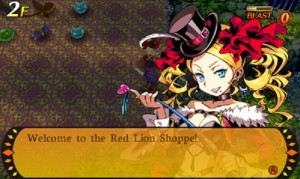 On the topic of fan translations, John has some interesting thoughts. “The worst way to get noticed is to try and relocalise a game that has already been released in some form. It is a terrible idea. Please do not do that because it opens you up to a lot of copyright lawsuits.” Nich agrees. “Responsible fan translating can be one of the good ways to get noticed. If there’s no localisation at all that is. Be responsible. If a publisher announces a localisation for a game you’re working on, drop it immediately. There are tons of games that need your help instead of something already being worked on. Final Fantasy Type 0 HD is a great example of a responsible fan translation that isn’t responsible anymore.”
On the topic of fan translations, John has some interesting thoughts. “The worst way to get noticed is to try and relocalise a game that has already been released in some form. It is a terrible idea. Please do not do that because it opens you up to a lot of copyright lawsuits.” Nich agrees. “Responsible fan translating can be one of the good ways to get noticed. If there’s no localisation at all that is. Be responsible. If a publisher announces a localisation for a game you’re working on, drop it immediately. There are tons of games that need your help instead of something already being worked on. Final Fantasy Type 0 HD is a great example of a responsible fan translation that isn’t responsible anymore.”
Localising games isn’t just about text, and in many cases visuals need to be redone. “We usually get 3 sets of files when it comes to localisation. The raw text in the form of actual scripting files used in game, the voice script which often contains dialogue not mentioned in the text, and finally all the graphic text that shows up as images or textures and sprites. We work on each of these separately. Graphic text is something we work on first because once we’re done, it’s more time consuming to implement. All the images need to be remade based on our specifications, so we make a spreadsheet explaining the changes.” Atlus USA doesn’t do any development in house. The changes are either done by Atlus Japan or a third party.
Many games in Japan make use of a lot of references that won’t be too familiar in the West. A good example is Persona Q’s 4th dungeon, involving strong men carrying an arc seen in festivals. “In the case of Persona Q we added a lot of dialogue that explains some things. This let us be accurate to the true tone of the game and get the meaning across.”
Some words remain unchanged, like Takoyaki in Persona Q. I had no idea what it was when I played the game until I looked it up. John explains: “It’s a matter of taste. We try and stay close to the origins. You probably have seen the comic strip featuring Phoenix Wright. The changes get more and more pronounced. There’s a frame showing him wearing a kimono and eating sashimi, while the bubble says ‘Eat your hamburger Apollo!’ or something to that extent. We want to avoid that. We don’t change things if we don’t need to. You can see Takoyaki in the visuals so we didn’t want to make it so that Junpei would ask Rei about a hamburger instead of Takoyaki.”
Nich said they don’t change the game design or mechanics while localising. “I remember there was some discussion about Etrian Odyssey 1’s difficulty. People thought it was too hard. We decided to trust the designers and not mess with it. I can’t think of any game that had specific changes in difficulty or design when it got localised.”
Sales numbers in Japan make no real difference to a game’s localisation in the West at Atlus USA. John: “Japanese sales vs western sales are like apples and oranges. We look for games that fit our brand. A game could be a hit in Japan and have a niche audience here. Both regions have different audiences with different play styles. A publisher could release 1 or 2 games a year but we’re localising 4 games in a quarter or 6 months. We have a lot more titles on our plate at all times. Look at Etrian Mystery Dungeon: it releases in Japan tomorrow and it will be out in the US a month later. Our projects are rarely affected by Japanese sales numbers. “
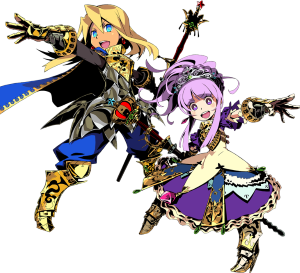 On his hardest localisation project till date, Nich talks about Growlancer: Heritage of War. “It was an old game and really hard for a lot of reasons. The files themselves were hard to work with and we weren’t too familiar with the developer. Preparing files to start work took really long and it was just rough overall.” On the other side of the spectrum, Radiant Historia is mentioned. “Radiant Historia is my favourite project. It isn’t well known but the subject matter and characterisations were so different from what I usually work on. It was a breath of fresh air that let me stretch some writing muscles I don’t normally use.”
On his hardest localisation project till date, Nich talks about Growlancer: Heritage of War. “It was an old game and really hard for a lot of reasons. The files themselves were hard to work with and we weren’t too familiar with the developer. Preparing files to start work took really long and it was just rough overall.” On the other side of the spectrum, Radiant Historia is mentioned. “Radiant Historia is my favourite project. It isn’t well known but the subject matter and characterisations were so different from what I usually work on. It was a breath of fresh air that let me stretch some writing muscles I don’t normally use.”
Sometimes, character limitations in the game’s interface can cause problems for fans. “In Persona Q, we had to make do with the space limitations for the name. There wasn’t enough room for 8 character names. We really felt bad about that. A lot of fans would want to use Yu Narukami or whatever else for P4Hero. Unfortunately, we couldn’t do anything about that.”
Last year saw the surprise release of Shin Megami Tensei 1 for iOS. This is the only official translation of the game. On the possibility of Shin Megami Tensei II or if…, Nich says: “I was happy to work on it. Its possible for those two but currently nothing is planned.”
With only a one month gap between the Japanese and North American releases of Etrian Mystery Dungeon, it is obvious that Atlus USA was working on it for a long time. “It isn’t our fastest turn around time for sure. Dragon’s Crown and Persona 4 Arena were a week apart. When you want to release something this soon, you have to start working on it before it is completely finished. It is kind of a hassle for us because we might need to redo work because some changes can be made on the Japanese team’s end. This might make us have to redo some files that were completed. I think the extra work we endure is worth it in the end for the fans. They get to play things so soon after Japan.”
Etrian Mystery Dungeon is the second crossover game Atlus has done in recent times. Persona Q is a crossover between Persona 3 and Persona 4 characters and Etrian Odyssey. It even gets the Q in the name as a throwback to Etrian Odyssey’s Japanese name. Etrian Mystery Dungeon takes Atlus’ Etrian Odyssey franchise and brings it together with Spike Chunsoft’s Mystery Dungeon games. “EMD is pretty different from any Etrian game, even if you’ve played all of them. It is a Mystery Dungeon game. When I say that I mean rogue-likes. The genre where you go into a dungeon that is randomly generated and don’t know what to expect. The enemies, the structure, everything changes. What you have to do is make the best of your trip. You may find a great sword that gives you an advantage or you may not and end up being poorly equipped for a powerful enemy. You have to figure out how to handle each situation and escape if needed. It is a very different setting and plot style to what RPG fans are used to. The whole mindset of getting strong enough by grinding to kill a certain enemy won’t always work.”
 Games like Persona Q or Etrian Odyssey Untold let you grind enough to steamroll over enemies. John: “In Mystery Dungeons, you’re presented with situations where unfortunate things will happen. You can’t do anything about it because it is never predictable. Your tank might step on a sleep trap, causing him to not taunt enemies and your medic gets killed in 2 hits in a room full of monsters. You either watch your party die or have the foresight to see a hopeless situation and escape while you can”
Games like Persona Q or Etrian Odyssey Untold let you grind enough to steamroll over enemies. John: “In Mystery Dungeons, you’re presented with situations where unfortunate things will happen. You can’t do anything about it because it is never predictable. Your tank might step on a sleep trap, causing him to not taunt enemies and your medic gets killed in 2 hits in a room full of monsters. You either watch your party die or have the foresight to see a hopeless situation and escape while you can”
The strategy in EMD is very different from an Etrian Odyssey game. Nich: “When you run into a strong enemy and die in an Etrian Odyssey game, you look at your party and skills or tools and come up with something to beat it. In Mystery Dungeon, when you die you have to think of what you could have done in that situation. Whether you had something in your inventory that could help. You will die often for sure. You could even say EMD is our party to help Nintendo sell more new 3DS consoles as people might fling their old ones out the window in frustration (laughs).”
Saving is super important in JRPGs and many games let you exploit save spots or save files. EMD’s difficulty doesn’t stop in the dungeon. There is only a single save file and it auto saves whenever you enter or leave a dungeon. “That’s a big deal in mystery dungeon games and rogue-likes. It auto-saves. All your mistakes and deaths are all saved. There’s no reload to avoid something. You have to figure out a way to come back. This is more forgiving than other rogue-likes that make you start over from the beginning if you die. Here you get to keep skills and characters but lose items, and this can really hurt.”
Speaking of rogue-likes, Nich has some thoughts on Rogue Legacy. “I like it a lot. I played through two loops of the game but could not get past new game++. I had a great time with it. It is different from what we’re doing in EMD. It doesn’t have that feel of permanent loss. You never really lose anything in Rogue Legacy but that particular character and you even come back with the HP and what you put money into there. You will still have things unlocked. I like that system a lot but it isn’t what I’m looking for in rogue-likes. I’m a huge fan of games like Nethack and Dungeon Crawl Stone Soup.”
EMD does have a lot from Etrian contrary to what has been seen in combat. John confirms: “There are no maps because everything is randomly generated. Etrian’s Skill tree and class system is here. When you run into a DOE in EMD, you get that quickened heartbeat you get when you run into an FOE in Etrian IV. EMD also features the crafting style seen in Etrian games with minerals and plants to build the next big weapon.” Nich tells me: “One thing you get here that you don’t get in other mystery dungeon games is the team synergy from Etrian Odyssey. It isn’t just about classes and skills but putting together a good team. You have a 4 person team here and not 5 or 1 like in other rogue-likes. There are a few challenge dungeons later that send 1 single person into a dungeon though. The main game is figuring out the best team you can put together and that’s very Etrian to me.”
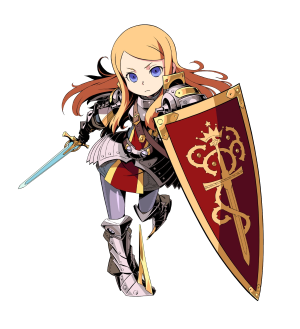 On how much worse DOEs are compared to FOEs, John chimes in with bad memories. “Every single encounter I’ve had with a DOE has resulted in tragedy. I remember I was playing through Etrian IV and I didn’t have to get too far over level to take out an FOE. I think it is one of those things where once you get to the point where you can take on and defeat a DOE, you’re really understanding EMD’s systems. Between skill binds, arm binds, head bind, etc, being able to manage damage with a protector, this is when it really starts to click with people.” Nich backs this up: ”The only situation in the game that lets you have an 8 person party is when a DOE attacks. You really have to make use of the fort system.”
On how much worse DOEs are compared to FOEs, John chimes in with bad memories. “Every single encounter I’ve had with a DOE has resulted in tragedy. I remember I was playing through Etrian IV and I didn’t have to get too far over level to take out an FOE. I think it is one of those things where once you get to the point where you can take on and defeat a DOE, you’re really understanding EMD’s systems. Between skill binds, arm binds, head bind, etc, being able to manage damage with a protector, this is when it really starts to click with people.” Nich backs this up: ”The only situation in the game that lets you have an 8 person party is when a DOE attacks. You really have to make use of the fort system.”
The fort system is a new mechanic not previously seen in Etrian Odyssey games. “Forts are good for a lot of things. You can build one on the staircase of a dungeon and once you have it in place, the structure of the dungeon is frozen. This way you can kind of know what to expect for the rest of the dungeon. You know the pathways through it. This can be something you have to learn rather than take in everytime. Forts also protect you against DOEs. Once the DOE reaches the fort it will ask if you want to come back and fight. Even if you refuse, an empty fort is good protection. The DOE will just trash it and go back to the bottom floor of the dungeon. You can use an unmanned fort as protection.” John thinks it is a great idea to protect your town. “It stops your town from getting wrecked and you do not want your town damaged. Search forts are better than the standard ones as they can see DOEs sooner. They cost more but help. It makes sense to build another fort in front of the search fort and let the DOE wreck that one.”
Difficulty is something that a lot of people love or hate about Etrian games. I’ve been playing EMD for a few weeks now and it is quite something. John explains: “I think it is right in line with the other Etrian games in terms of difficulty. A lot of veterans will struggle initially because of the drastic change in mechanics. You have to worry where everyone in your party is on the grid layout. Are they diagonal from the enemy when being attacked? You need to make sure the synergy is there. Swap leaders making sure everyone is protected and positioned well. Once you get the hang of these things, the difficulty kind of lowers a bit. It isn’t super hard like Etrian 1 or 2, but not as forgiving as Etrian IV or Untold. The random element will contribute largely. None of your traditional RPG thinking will work here.”
Etrian Mystery Dungeon launched in Japan early this month with a bunch of free DLC that was added to make the game a little more forgiving for newcomers. John plays it coy when questioned. “Nothing confirmed yet, but hopefully we will have something about that very soon”
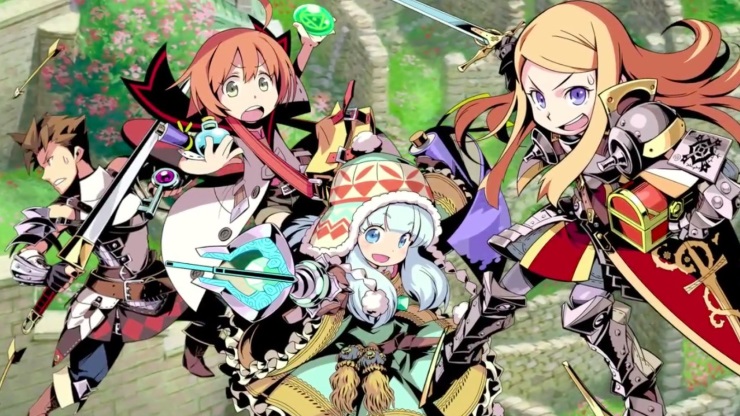
On how Atlus USA is one of the few publishers still doing first print bonuses on 3DS games in the so called digital gaming age, John had some interesting thoughts. “Personally as a gamer, I love the convenience of having everything on a single device. I put in a 1TB hard drive on my PS4 and didn’t look back. When you look at 3DS titles, especially Atlus ones, our fans really enjoy physical media. The games we release aren’t the most popular in the world, as much as I’d like to believe that. We don’t do huge print runs. Those first run bonuses or preorder bonuses really do become special. It is strange how we see the used games market and while not many titles we release soar in value, they usually hold their value strong. I think the Catherine box set we did is one of the best ones ever released. It is nice to have some of them with so many extras. You can’t always have a printed manual, but we try and include at least a mini artbook or extra soundtrack for the fans.”
I’ve noticed the soundtracks in releases go from full 2-disc soundtracks like in Persona 1 Portable to 4-disc arrange albums in Persona Q. Nich has some thoughts on this situation: “A lot of the changes are because of what happens in Japan. The bonuses we give are usually similar. P1P had the full OST there. In games where the soundtrack is a full retail release, it limits what we can give away as a preorder bonus for free.”
Atlus games have some amazing music but almost all of it is super hard to buy and many releases aren’t even available physically let alone digitally now. On whether we can expect the soundtracks from games like Persona 4 on digital platforms, John says: ”It is a sticky situation. Fans have been asking for this for a while now and we have been trying to figure it out internally. I haven’t heard anything about it. These are Japanese artists and video game contracts are crazy enough as it is. If we start looking into music contracts I don’t even know what will happen. I have no idea about a time frame but hopefully this happens soon. I honestly would love for our fans to just be able to buy the music they want to easily. It isn’t easy. If it was, it would have been done already.”
No God is a Geek interview would be complete without the ketchup question. “We keep ketchup in the refrigerators,” says John. “There are 2 of them and one bottle in each. I also keep ketchup packets in my desk.”
Thanks to Nich Maragos and John Hardin at Atlus USA for their time.


